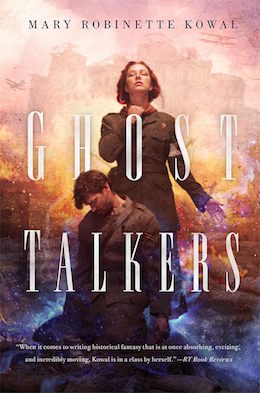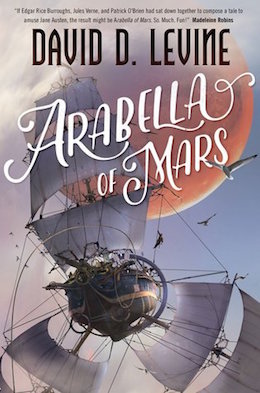Let’s say you like the Regency era, but you also like space opera, and really like Patrick O’Brian. And Mars. Normally, mixing all of these disparate elements together would be a hot mess, but David D. Levine’s Arabella of Mars is awesome. I am completely in love with this book and want another one yesterday.
Where to start… How about Mars? The book opens on Mars and it’s the Mars of Edgar Rice Burroughs with vast alien civilizations, but it’s seen through the lens of British colonialism. Wait—that makes it sound dry, and it’s not. Well, I mean, it IS a desert, but the plot is about as far from dry as you can get. What I mean is that Arabella has a nanny, effectively, in the form of Khemel, her Martian protector. They have a genuinely affectionate bond, but the book doesn’t gloss over the way the British Empire created exactly these dynamics here on Earth.
What I love about the book is that it’s smart, and it’s smart without sacrificing forward plot momentum.
So while the book starts on Mars, it doesn’t stay there. In fact one of the first things that happens is that Arabella gets shipped back to Earth because her mother is concerned about how she is running amok on Mars.
It’s nice to see the Regency from the point of view of someone who is both British and not at the same time. Arabella is Martian. Earth is strange to her. It is warm and damp and heavy. And because she’s grown up in a colonial outpost, the customs all seem strange.
From there, for reasons which I won’t go into because it’s way more fun to experience it, Arabella has to go back to Mars and to do so she winds up disguising herself as a boy and working on a Marsma. This is the interstellar version of the Indiaman, which plied the seas between England and India in the 1800s.
Here interstellar currents between planets allow people to travel back and forth on interstellar ships. And this is where you can really tell that David Levine is a science fiction writer, because having decided upon this outrageous conceit of an interstellar wind between planets, everything from that point forward is rigidly scientifically accurate. He thinks about “free descent.” He thinks about navigation. How does one navigate between worlds using 19th-century technology? And through all of this you have an exciting yarn and about a young woman who is torn out of her place and still manages to excel even within the confines of her role in society.
And it’s also just plain fun. There are pirates. In space. In the Regency!
You with me so far? Because in addition to the social drama, this is also an adventure at sea. Or in this case space. Here, too, David doesn’t disappoint. He manages a large cast of characters, such as would be on a sailing ship in the 1800s, and gives them each a distinct personality. Because Arabella is new on board, she’s at the bottom of the pecking order. Her jobs are the least desirable and the grubbiest, which really gives you a sense of what life a sea would have been like.
Except, of course, that they are in space. So she has to have a safety line around her ankle as she moves around ship. It is a source of constant tension, because one wrong move could send someone spinning out past the ship to float between worlds. You can’t drown in this endless vastness, but you can die slowly of starvation and dehydration. The dangers of space are clear and almost a character in their own right.
And yet, what I wanted most, while reading this, was to be able to go on one of these vessels. I wanted the Mars of David’s imagination to be real. I wanted Arabella to teach me how to navigate the Martian desert at night. I wanted to fly through the gunnery deck in free descent.
As I said when I started, there are so many amazing ideas packed into this book, that in a lesser writer’s hands it would be a hot mess. In actuality, Arabella of Mars is awesome piled upon awesome.
Read the first three chapters from Arabella of Mars here on Tor.com!
 Mary Robinette Kowal is the author of Ghost Talkers and The Glamourist Histories series of fantasy novels. She has received the Campbell Award for Best New Writer, three Hugo awards, and the RT Reviews award for Best Fantasy Novel. Her work has been nominated for the Hugo, Nebula and Locus awards. Her stories appear in Asimov’s, Clarkesworld, and several Year’s Best anthologies. Mary, a professional puppeteer, also performs as a voice actor, recording fiction for authors such as Seanan McGuire, Cory Doctorow and John Scalzi. She lives in Chicago with her husband Rob and over a dozen manual typewriters.
Mary Robinette Kowal is the author of Ghost Talkers and The Glamourist Histories series of fantasy novels. She has received the Campbell Award for Best New Writer, three Hugo awards, and the RT Reviews award for Best Fantasy Novel. Her work has been nominated for the Hugo, Nebula and Locus awards. Her stories appear in Asimov’s, Clarkesworld, and several Year’s Best anthologies. Mary, a professional puppeteer, also performs as a voice actor, recording fiction for authors such as Seanan McGuire, Cory Doctorow and John Scalzi. She lives in Chicago with her husband Rob and over a dozen manual typewriters.










